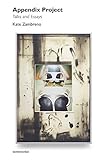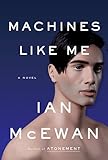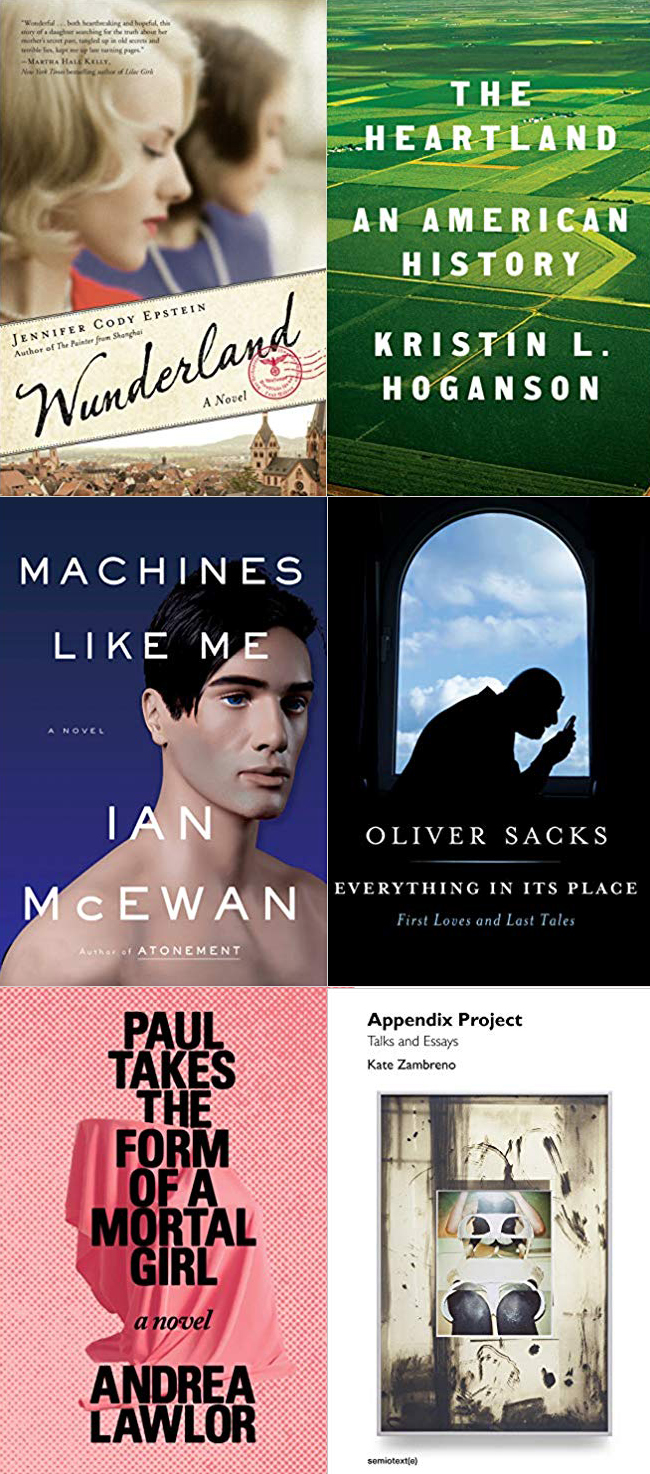Here’s a quick look at some notable books—new titles from the likes of Oliver Sacks, Kate Zambreno, Andrea Lawlor, Ian McEwan, and more—that are publishing this week.
Want to learn more about upcoming titles? Then go read our most recent book preview. Want to help The Millions keep churning out great books coverage? Then sign up to be a member today.
Everything in Its Place by Oliver Sacks
 Here’s what Publishers Weekly had to say about Everything in Its Place: “In this lovely collection of previously unpublished essays, the late, celebrated author and neurologist Sacks (The River of Consciousness) muses on his career, his youth, the mental health field, and much more. Readers will learn of influences that molded Sacks’s brilliant mind, from the cephalopod specimens at the Natural History Museum in London to the ‘visionary, mystical’ 19th-century scientist Humphry Davy, whom Sacks dubs the ‘Poet of Chemistry.’ Of the many remarkable essays on medical conditions, ‘Travels with Lowell’ stands out for its sensitivity and nuance, as Sacks travels the world alongside a photographer with Tourette’s, interviewing others with the condition, including one man who could trace incidents of the syndrome back six generations in his family, yet was not officially diagnosed until age 38. Sacks also recalls being consulted in the case of actor/writer Spalding Gray, who became desperately, compulsively depressed after a brain injury in 2001 and died by suicide three years later. Sacks’s gentle, ruminative voice is a salve when investigating difficult subject matter, but there are plenty of lighter moments as well, as in a brief discussion of a topic dear to his heart—New York City’s many and varied streetlamps. Piercingly insightful and delightfully strange, Sacks’s final collection is a treat for the chronically curious.”
Here’s what Publishers Weekly had to say about Everything in Its Place: “In this lovely collection of previously unpublished essays, the late, celebrated author and neurologist Sacks (The River of Consciousness) muses on his career, his youth, the mental health field, and much more. Readers will learn of influences that molded Sacks’s brilliant mind, from the cephalopod specimens at the Natural History Museum in London to the ‘visionary, mystical’ 19th-century scientist Humphry Davy, whom Sacks dubs the ‘Poet of Chemistry.’ Of the many remarkable essays on medical conditions, ‘Travels with Lowell’ stands out for its sensitivity and nuance, as Sacks travels the world alongside a photographer with Tourette’s, interviewing others with the condition, including one man who could trace incidents of the syndrome back six generations in his family, yet was not officially diagnosed until age 38. Sacks also recalls being consulted in the case of actor/writer Spalding Gray, who became desperately, compulsively depressed after a brain injury in 2001 and died by suicide three years later. Sacks’s gentle, ruminative voice is a salve when investigating difficult subject matter, but there are plenty of lighter moments as well, as in a brief discussion of a topic dear to his heart—New York City’s many and varied streetlamps. Piercingly insightful and delightfully strange, Sacks’s final collection is a treat for the chronically curious.”
Appendix Project by Kate Zambreno
 Here’s what Publishers Weekly had to say about Appendix Project: “Presented as a series of appendices to novelist and memoirist Zambreno’s previous work, Book of Mutter, this collection of 11 talks and essays reveals her anew as a master of the experimental lyric essay. In an allusive, fluid style worthy of Susan Sontag or Virginia Woolf, Zambreno roves wildly over what seem disparate reference points, but never fails to center the essays around approachable themes—most prominently, her mother’s death, also the subject of Book of Mutter. In one entry, Zambreno blends critical theory, philosophy, and memoir, moving from analyses of paintings by On Kawara, to musings on how Roland Barthes captures the ‘looping character of mourning, as it attempts and fails to be rendered into language,’ and on to experiences of new motherhood. In another piece initially devoted to her thoughts on turning 40, Zambreno ends by considering how to preserve one’s privacy even in personal writing, reflecting on why she omitted a revealing anecdote about her mother from Book of Mutter, but considered including a section about Marilyn Monroe’s death. For some, her book may seem esoteric and overly diffuse. But for most, the calm inquiry, wise voice, and poignant urgency behind every sentence will coalesce into a deeply reflective meditation on art, loss, and how ‘time makes the intensity of mourning pass—and yet, nothing is soothed.'”
Here’s what Publishers Weekly had to say about Appendix Project: “Presented as a series of appendices to novelist and memoirist Zambreno’s previous work, Book of Mutter, this collection of 11 talks and essays reveals her anew as a master of the experimental lyric essay. In an allusive, fluid style worthy of Susan Sontag or Virginia Woolf, Zambreno roves wildly over what seem disparate reference points, but never fails to center the essays around approachable themes—most prominently, her mother’s death, also the subject of Book of Mutter. In one entry, Zambreno blends critical theory, philosophy, and memoir, moving from analyses of paintings by On Kawara, to musings on how Roland Barthes captures the ‘looping character of mourning, as it attempts and fails to be rendered into language,’ and on to experiences of new motherhood. In another piece initially devoted to her thoughts on turning 40, Zambreno ends by considering how to preserve one’s privacy even in personal writing, reflecting on why she omitted a revealing anecdote about her mother from Book of Mutter, but considered including a section about Marilyn Monroe’s death. For some, her book may seem esoteric and overly diffuse. But for most, the calm inquiry, wise voice, and poignant urgency behind every sentence will coalesce into a deeply reflective meditation on art, loss, and how ‘time makes the intensity of mourning pass—and yet, nothing is soothed.'”
Wunderland by Jennifer Cody Epstein
 Here’s what Publishers Weekly had to say about Wunderland: “Epstein’s heartbreaking historical tour de force (after The Painter from Shanghai) juxtaposes Nazi-era Germany and 1980s New York City to devastating effect. The story opens in 1933: German schoolgirls Renate Bauer and Ilse von Fischer are best friends as Hitler comes to power and Jews become increasingly demonized. Renate is dating a young white supremacist and, along with Ilse, tries to join the Nazi-sponsored Bund Deutscher Madel. But after Renate discovers that her now-Christian father was born Jewish, Renate and her family are subjected to Gestapo questioning and blackmail. Ilse coldly drops her best friend, and, caught up in the growing nationalism, she betrays Renate’s family. In the East Village in 1989, Ava Fischer receives her estranged mother’s ashes and a sheaf of letters that outline her mother’s biggest regrets. She’s always felt unwanted by her mother, after being left for years in a German orphanage. But after she obtains the package, which contains a shocking secret about her parentage, everything suddenly makes a strange sort of sense. Epstein doesn’t stint on the horrifying details of the indignities dealt to Jews during Hitler’s reign. Man’s inhumanity to man—and the redemptive power of forgiveness—is on stark and effective display in Epstein’s gripping novel, a devastating tale bound for bestseller lists.”
Here’s what Publishers Weekly had to say about Wunderland: “Epstein’s heartbreaking historical tour de force (after The Painter from Shanghai) juxtaposes Nazi-era Germany and 1980s New York City to devastating effect. The story opens in 1933: German schoolgirls Renate Bauer and Ilse von Fischer are best friends as Hitler comes to power and Jews become increasingly demonized. Renate is dating a young white supremacist and, along with Ilse, tries to join the Nazi-sponsored Bund Deutscher Madel. But after Renate discovers that her now-Christian father was born Jewish, Renate and her family are subjected to Gestapo questioning and blackmail. Ilse coldly drops her best friend, and, caught up in the growing nationalism, she betrays Renate’s family. In the East Village in 1989, Ava Fischer receives her estranged mother’s ashes and a sheaf of letters that outline her mother’s biggest regrets. She’s always felt unwanted by her mother, after being left for years in a German orphanage. But after she obtains the package, which contains a shocking secret about her parentage, everything suddenly makes a strange sort of sense. Epstein doesn’t stint on the horrifying details of the indignities dealt to Jews during Hitler’s reign. Man’s inhumanity to man—and the redemptive power of forgiveness—is on stark and effective display in Epstein’s gripping novel, a devastating tale bound for bestseller lists.”
The Heartland by Kristin L. Hoganson
 Here’s what Publishers Weekly had to say about The Heartland: “In this sophisticated, complex work, history professor Hoganson (Consumers’ Imperium) uses the history of Champaign County, Ill., to explore and question the American myth of its ‘heartland’ as a safe, insulated, provincial place—‘the quintessential home referenced by ‘homeland security.’’ The first chapter shows how white settlers in 1700s and 1800s emphasized local settlement to justify taking land from the mobile Kickapoo population of Central Illinois. Hoganson uses the raising of cattle and hogs in Champaign to trace shifting borders on the North American continent in the 19th and early 20th centuries. Then she dismantles the myth of the isolationist heartland with an analysis of Champaign’s involvement with organizations such as the Inter-Parliamentary Union and the International Institute of Agriculture. And she flips the ‘flyover country’ cliché, looking at how Champaign citizens are connected to the rest of the world by telegraph wires, the weather, migratory birds, and military planes. The final chapter follows the Kickapoo people’s experiences into the 20th century, demonstrating that, contrary to myth, nothing about the heartland’s geography makes it a safe place. Deeply researched with a well-proven argument, Hoganson’s book will attract many scholars as well as general readers who like innovative, challenging history.”
Here’s what Publishers Weekly had to say about The Heartland: “In this sophisticated, complex work, history professor Hoganson (Consumers’ Imperium) uses the history of Champaign County, Ill., to explore and question the American myth of its ‘heartland’ as a safe, insulated, provincial place—‘the quintessential home referenced by ‘homeland security.’’ The first chapter shows how white settlers in 1700s and 1800s emphasized local settlement to justify taking land from the mobile Kickapoo population of Central Illinois. Hoganson uses the raising of cattle and hogs in Champaign to trace shifting borders on the North American continent in the 19th and early 20th centuries. Then she dismantles the myth of the isolationist heartland with an analysis of Champaign’s involvement with organizations such as the Inter-Parliamentary Union and the International Institute of Agriculture. And she flips the ‘flyover country’ cliché, looking at how Champaign citizens are connected to the rest of the world by telegraph wires, the weather, migratory birds, and military planes. The final chapter follows the Kickapoo people’s experiences into the 20th century, demonstrating that, contrary to myth, nothing about the heartland’s geography makes it a safe place. Deeply researched with a well-proven argument, Hoganson’s book will attract many scholars as well as general readers who like innovative, challenging history.”
Machines Like Me by Ian McEwan
 Here’s what Publishers Weekly had to say about Machines Like Me: “McEwan’s thought-provoking novel (after Nutshell) is about the increasingly fraught relationship between a man, a woman, and a synthetic human. Opening in an alternate 1982 London in which technology is not dissimilar from today’s (characters text and send emails), 32-year-old Charlie spends £86,000 of his inheritance on the ‘first truly viable manufactured human with plausible intelligence and looks,’ who can pass for human unless closely inspected. His name is Adam (there are 12 Adams and 13 Eves total; the Eves sell out first), and Charlie designs Adam’s personality along with his neighbor and girlfriend Miranda. Soon, Adam informs Charlie that he ‘should be careful of trusting her completely,’ and quickly falls in love with her, thus inextricably binding their fates together. The novel’s highlight is Adam, a consistently surprising character who quickly disables his own kill switch and composes an endless stream of haiku dedicated to Miranda because, as he states, ‘the lapidary haiku, the still, clear perception and celebration of things as they are, will be the only necessary form’ as misunderstanding is eradicated in the future. The novel loses steam when Adam’s not the focus: much page space is devoted to a thread about an orphan boy, as well as Charlie’s thoughts and feelings about Miranda. Though the reader may wish for a tighter story, this is nonetheless an intriguing novel about humans, machines, and what constitutes a self.”
Here’s what Publishers Weekly had to say about Machines Like Me: “McEwan’s thought-provoking novel (after Nutshell) is about the increasingly fraught relationship between a man, a woman, and a synthetic human. Opening in an alternate 1982 London in which technology is not dissimilar from today’s (characters text and send emails), 32-year-old Charlie spends £86,000 of his inheritance on the ‘first truly viable manufactured human with plausible intelligence and looks,’ who can pass for human unless closely inspected. His name is Adam (there are 12 Adams and 13 Eves total; the Eves sell out first), and Charlie designs Adam’s personality along with his neighbor and girlfriend Miranda. Soon, Adam informs Charlie that he ‘should be careful of trusting her completely,’ and quickly falls in love with her, thus inextricably binding their fates together. The novel’s highlight is Adam, a consistently surprising character who quickly disables his own kill switch and composes an endless stream of haiku dedicated to Miranda because, as he states, ‘the lapidary haiku, the still, clear perception and celebration of things as they are, will be the only necessary form’ as misunderstanding is eradicated in the future. The novel loses steam when Adam’s not the focus: much page space is devoted to a thread about an orphan boy, as well as Charlie’s thoughts and feelings about Miranda. Though the reader may wish for a tighter story, this is nonetheless an intriguing novel about humans, machines, and what constitutes a self.”
Also on shelves: Paul Takes the Form of a Mortal Girl by Andrea Lawlor.









